THE TSUNAMI CHALLENGE: AFTER THE TENT
A competition for the MIT and Cambridge community during Spring Break March 21-25, 2005
The challenge of the workshop was to brainstorm innovations in the resettlement process for Tsunami affected countries. Immediate large-scale demands, limited materials, disrupted communities, stressed government capabilities suggest new thinking is welcome. Tapping the creativity of students from throughout the extended MIT community offered an opportunity to rethink approaches to housing disaster-affected families.
The Challenge targeted the phase after the immediate disaster needs are addressed, and the search is for more permanent housing and settlement. What can be done that bridges immediate disaster relief and permanent development? Tents are the standard quick first-response for resettlement, but they have a limited lifespan and can only be temporary. 'After the tent' captures the concept of the next step, and this is the focus of the challenge.
Teams of students from MIT, Harvard, Rhode Island School of Design, and Tufts participated in 6 teams. The Challenge was carried out over a 'short' week: the first two afternoons were 'resource sessions' on Indonesia and Sri Lanka, the remaining two afternoons were spend in individual team mentoring, and the final presentations were Friday afternoon. The proposals of the six teams were as follows:
-"Participatory Framework for the Acehnese Community" (Team MIT-1)

- "100 Mosques 100 Dossoons" (Team MIT-2)
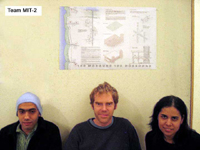
-"Post-Tsunami Reconstruction Guidelines"
(Team MIT-3)
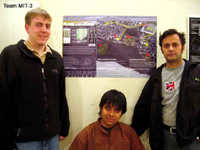
- "Deviating from the New D.U.Z." (De-Urbanized Zone) (Team RISD-1)
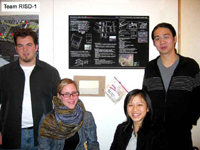
- "From Housing to Homes" (Team US-1)
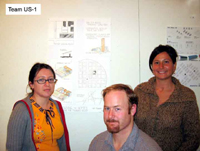
- "A Framework for Managing Design" (GSD-1)
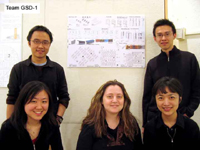
And who were the winners? Panelists debated long among themselves as to which to choose, since the approaches were so varied but all excellent. And in the final discussions, it was agreed to send representatives from all the teams to present their ideas to the Office of US Foreign Disaster Assistance in Washington, D.C. However, the GSD-1 Team inched out the rest with MIT-3 and RISD-1 teams second, and MIT-2 third.
Resource experts include Prof. Ryadi Adityavarman, Architect from Indonesia currently teaching at Wentworth; Hubert Murray, Architect and Planner, also teaching studios in the Department of Architecture; Marc Older, Planner, who recently visited Sri Lanka and evaluated housing reconstruction; Eswaran Selevrajah, Architect and Planner formerly of Sri Lanka and expert in housing and settlement upgrading; and Dr. Sanith Wijesinghe, who recently returned from Sri Lanka assisting in medical relief efforts, Prof. Michelle Addington, Harvard School of Design, Dr. Robert Cowherd, RISD, who had carried out extensive research in Indonesia and had just returned from Banda Aceh, and Dr. Reinhard Goethert, who had worked earlier with the UNHCR and Sri Lanka, and more recently with fishing communities in Indonesia.
Representatives from the teams have been invited to present their ideas to Office of US Foreign Disaster Assistance (OFDA), United States Agency for International Development (USAID), Washington, D.C
The workshop was hosted by SIGUS (Special Interest Group in Urban Settlement) of the School of Architecture and Planning, MIT, directed by Dr. Reinhard Goethert, and in collaboration with Prof. Robert Cowherd, Rhode Island School of Design.

